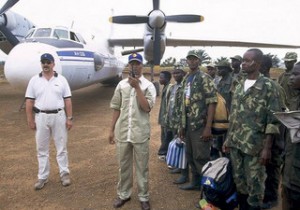Tackling legal loopholes in the international weapons trade
If there’s one thing we’ve learned from Mr. Bout, it’s that the world needs an Arms Trade Treaty.
On April 5, the Federal New York District Court is expected to announce the sentence for Viktor Bout, a Russian arms dealer believed to be the inspiration for Nicolas Cage’s character in Hollywood’s “Lord of War,” who was found guilty of four counts of conspiracy, including conspiracy to provide material support to a foreign terrorist organization.

Though the sentencing marks a major victory for those who spent decades tracking Mr. Bout, it’s unlikely that he will ever serve justice for other alleged acts, such as supplying weapons to countries in violation of UN arms embargoes, selling weapons to abusive regimes unable to purchase weapons through the legal market, or fueling civil wars in the Democratic Republic of Congo, Angola, Sierra Leone, and Afghanistan. That’s because Mr. Bout, like many arms dealers, is skilled at operating in the black holes of the international regulatory system and circumventing the jurisdiction of countries. Indeed, more can be done to prevent unnecessary death caused by the irresponsible and under-regulated arms trade.
If there’s one thing we’ve learned from Mr. Bout, it’s that the world needs an Arms Trade Treaty (ATT). While the United States and a few other countries have strict laws regulating the arms trade, many countries still have weak, ineffective, or no regulations. For example, only 52 governments have laws regulating arms brokers and less than half of these have criminal or monetary penalties associated with illegal brokering. If more countries had stronger laws on the arms trade, Mr. Bout may have been held accountable for the crimes he allegedly committed.
An ATT would require countries to adopt strong laws that would govern the flow of weapons in and out of their borders and prevent weapons from reaching the hands of warlords and human rights abusers. When the world gathers at the United Nations this summer to negotiate the treaty, governments must make the most of the opportunity and close the loopholes that allow arms dealers like Mr. Bout to flourish on the suffering of others.
Unfortunately, opponents to the treaty, such as the National Rifle Association (NRA), claim the United Nations will chip away at Americans’ right to own guns. This nonsense couldn’t be further from the truth. In fact, an ATT would bring the rest of the world closer to the standards on international arms transfers followed by the United States; these standards do not affect US citizens’ Second Amendment rights. Unless more countries adopt rigorous standards and regulations, the United States and other countries will continue facing challenges apprehending irresponsible arms brokers.
For too long, innocent people have become victims of atrocious acts of violence and investigation because there are no international laws governing the cross-border sale of weapons. It’s time to close the loopholes and tackle the problem of the irresponsible arms trade.